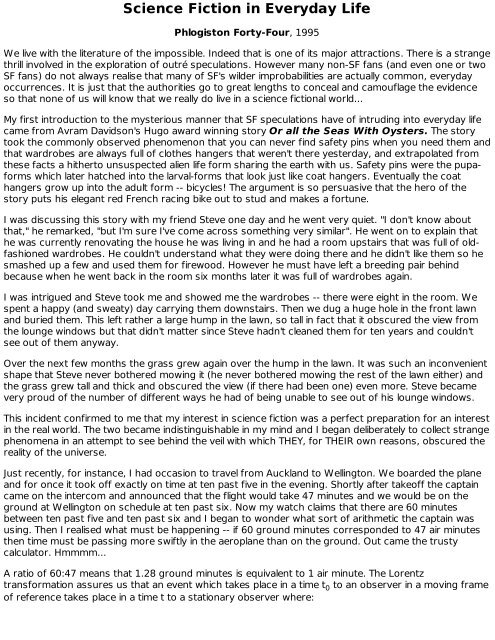Triffids Beard 2 - The Bearded Triffid
Triffids Beard 2 - The Bearded Triffid
Triffids Beard 2 - The Bearded Triffid
Create successful ePaper yourself
Turn your PDF publications into a flip-book with our unique Google optimized e-Paper software.
Science Fiction in Everyday Life<br />
Phlogiston Forty-Four, 1995<br />
We live with the literature of the impossible. Indeed that is one of its major attractions. <strong>The</strong>re is a strange<br />
thrill involved in the exploration of outré speculations. However many non-SF fans (and even one or two<br />
SF fans) do not always realise that many of SF's wilder improbabilities are actually common, everyday<br />
occurrences. It is just that the authorities go to great lengths to conceal and camouflage the evidence<br />
so that none of us will know that we really do live in a science fictional world...<br />
My first introduction to the mysterious manner that SF speculations have of intruding into everyday life<br />
came from Avram Davidson's Hugo award winning story Or all the Seas With Oysters. <strong>The</strong> story<br />
took the commonly observed phenomenon that you can never find safety pins when you need them and<br />
that wardrobes are always full of clothes hangers that weren't there yesterday, and extrapolated from<br />
these facts a hitherto unsuspected alien life form sharing the earth with us. Safety pins were the pupaforms<br />
which later hatched into the larval-forms that look just like coat hangers. Eventually the coat<br />
hangers grow up into the adult form -- bicycles! <strong>The</strong> argument is so persuasive that the hero of the<br />
story puts his elegant red French racing bike out to stud and makes a fortune.<br />
I was discussing this story with my friend Steve one day and he went very quiet. "I don't know about<br />
that," he remarked, "but I'm sure I've come across something very similar". He went on to explain that<br />
he was currently renovating the house he was living in and he had a room upstairs that was full of oldfashioned<br />
wardrobes. He couldn't understand what they were doing there and he didn't like them so he<br />
smashed up a few and used them for firewood. However he must have left a breeding pair behind<br />
because when he went back in the room six months later it was full of wardrobes again.<br />
I was intrigued and Steve took me and showed me the wardrobes -- there were eight in the room. We<br />
spent a happy (and sweaty) day carrying them downstairs. <strong>The</strong>n we dug a huge hole in the front lawn<br />
and buried them. This left rather a large hump in the lawn, so tall in fact that it obscured the view from<br />
the lounge windows but that didn't matter since Steve hadn't cleaned them for ten years and couldn't<br />
see out of them anyway.<br />
Over the next few months the grass grew again over the hump in the lawn. It was such an inconvenient<br />
shape that Steve never bothered mowing it (he never bothered mowing the rest of the lawn either) and<br />
the grass grew tall and thick and obscured the view (if there had been one) even more. Steve became<br />
very proud of the number of different ways he had of being unable to see out of his lounge windows.<br />
This incident confirmed to me that my interest in science fiction was a perfect preparation for an interest<br />
in the real world. <strong>The</strong> two became indistinguishable in my mind and I began deliberately to collect strange<br />
phenomena in an attempt to see behind the veil with which THEY, for THEIR own reasons, obscured the<br />
reality of the universe.<br />
Just recently, for instance, I had occasion to travel from Auckland to Wellington. We boarded the plane<br />
and for once it took off exactly on time at ten past five in the evening. Shortly after takeoff the captain<br />
came on the intercom and announced that the flight would take 47 minutes and we would be on the<br />
ground at Wellington on schedule at ten past six. Now my watch claims that there are 60 minutes<br />
between ten past five and ten past six and I began to wonder what sort of arithmetic the captain was<br />
using. <strong>The</strong>n I realised what must be happening -- if 60 ground minutes corresponded to 47 air minutes<br />
then time must be passing more swiftly in the aeroplane than on the ground. Out came the trusty<br />
calculator. Hmmmm...<br />
A ratio of 60:47 means that 1.28 ground minutes is equivalent to 1 air minute. <strong>The</strong> Lorentz<br />
transformation assures us that an event which takes place in a time t 0 to an observer in a moving frame<br />
of reference takes place in a time t to a stationary observer where:


